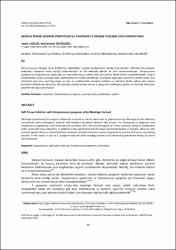Müsilaj teması sonrası streptococcus pyogenes ile gelişen yumuşak doku enfeksiyonu

View/Open
Access
info:eu-repo/semantics/openAccesshttp://creativecommons.org/licenses/by-nc-nd/3.0/us/Date
2024Metadata
Show full item recordAbstract
Küresel ısınma etkisiyle, deniz bitkilerinin salgıladıkları organik maddelerden müsilaj oluşmaktadır. Müsilajın bazı patojen bakterileri konsantre etme özelliği bulunmaktadır ve bol miktarda bakteri ve virüs barındırmaktadır. Streptococcus pyogenes ve Streptococcus agalactiae için hayvanlar taşıyıcı olmasa bile ters-zoonoz olarak etkeni taşıyabilmektedir. Grup A Streptokoklar (GAS); yumuşak doku enfeksiyonlarına neden olmaktadır. İnsanlarda doğrudan nekrotizan fasiite sebep olan etkenlerin yanı sıra, evcil hayvanlar ve bazı su canlılarından insanlara bulaşan ve nekrotize fasiite sebep olan zoonoz karakterli etkenler de mevcuttur. Bu raporda; müsilaj teması sonrası S. pyogenes enfeksiyonu gelişen ve seyrinde hipoestezi gözlenen bir olgu sunulmuştur. Mucilage is produced from organic substances secreted by marine plants due to global warming. Mucilage has the ability to concentrate some pathogenic bacteria and harbours abundant bacteria and viruses. For Streptococcus pyogenes and Streptococcus agalactiae, even if animals are not hosts, they can carry the agent as reverse zoonosis. Group A Streptococci (GAS) cause soft tissue infections. In addition to the agents that directly cause necrotizing fasciitis in humans, there are also zoonotic agents that are transmitted from domestic animals and some marine organisms to humans and cause necrotizing fasciitis. In this report, a case of S. pyogenes infection after mucilage contact and observed hypoesthesia during its course was presented.
Source
ANKEM DergisiVolume
38Issue
2Collections
The following license files are associated with this item:


















